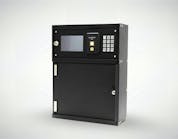An institutional locksmith job is similar yet different from a commercial or commercial/residential locksmith. The institutional locksmith may work with fewer lock manufacturers’ hardware or in some instances, if unlucky, the institutional locksmith may have inherited building(s) using many different manufacturer’s locks. He or she may be the recipient of bean counters’ financially driven decisions.
The institutional locksmith I had the pleasure of interviewing for this article is in charge of approximately 15,000 doors, covering a number of buildings. This is a sensitive government job performed by dedicated locksmiths whose identity and locations cannot be discussed. The answers to Ledger’s questions relate to the job requirements of just about every office building(s) institutional locksmith.
How did you get started in locksmithing?
My family was financially strapped when I was growing up. To make money, I went to work for the neighborhood locksmith sweeping up. I became interested in how locks worked and seeing my work habit and interest, he began to teach me. I worked for him until I graduated high school.
What was required for this job?
Five years of journeyman locksmith experience and knowledge of Best Interchangeable Core, SFIC.
How long have you been on the job?
A bit more than 13 years here.
What are the advantages of your (institutional) job?
I receive complete medical, dental and vision coverage at a much reduced rate. Since I have the prescribed number of years, I have qualified for a retirement package that includes medical. As a union member, my job is very secure.
How many locksmith work with you?
I am the locksmith leadsman. There are a total of four locksmiths.
What is your work schedule?
Four days a week, ten hours a day. My schedule is Monday through Thursday. Every locksmith works four days - no weekends.
How are emergencies handled during off time?
If there is an emergency, a locksmith is called and he receives at least eight hours straight time pay.
How do you keep track of all the doors?
All of the doors are bar coded. We have a computer program that tracks everything about each opening - the lock, what keys operate the locks, who has keys, who had keys, who approved the key and lock service requests, status of all work performed and door hardware. We also keep track of all core combinations, current and used.
What are the jobs of a locksmith?
We service all the hardware in the opening except the electrical connections. All of our locks are Best SFIC compatible. The locks and other architectural hardware are represented by all manufacturers. Since we are a government organization, we can not exclude manufacturers.
This past year we handled over 800 calls for service. All of our access controlled openings are activated by HID employee badges. We install or repair/replace between 50 and 100 locks each month.
In addition to working as a locksmith, what additional duties do you perform?
I work with lock manufacturers to provide the correct lock hardware on new and renovation construction, and revise construction specifications as new hardware becomes available. Also I have all shop administrative duties.
What key machines do you have?
We have two Rytan duplicators, a Silca tubular machine, an Ilco steel key machine, two HPC 1200 code machines, two Best SFIC punch machines and an Ilco engraver.
Do you use original key blanks or aftermarket key blanks?
We only use original key blanks for door locks. For auxiliary locks, we purchase the best price key blanks. Every key that is cut is stamped with an identification number.
How do you exercise key control?
We are very strict on keys. A manager must sign each and every key request. Only one key is given for each request. For any level master keys, additional signatures are required. If a key is lost, the fine is $25 for an employee and much higher for contractors. All of our controlled keys have a blind serial number that is referenced to an employee.
Do you follow a set maintenance schedule or fix on demand?
With 15,000 openings and only four locksmiths, most of our maintenance is on demand. We try to do periodic inspections of high traffic areas and repair/adjust locks as needed.
Which electro-mechanical locks do you use?
For standalone, at this time we use Marks I-Que. For hardwire applications, we use Best, Schlage, and SDC.
What mechanical locks do you like to use?
The SARGENT 11 Line T-Zone cylindrical lock is the best Grade 1 lock I have ever used. We have been using them for almost 6 years now. The only problem we have is a failed latch once in a while.
Do you install and service door closers?
We install LCN 4041 and Norton 7500 door closers. We also have Rixson in-floor closers.
Do you repair/replace doors?
Doors in some work and public areas take a terrific beating, and are replaced as needed.
Do you do install other door hardware?
We install and service Von Duprin, Detex and Adams-Rite electrified panic bars.
Do you install and service power operators?
Yes
Do you do
electrical work?
Union electricians do the 110 volt AC and low voltage AC/DC. All electrified locks are ordered with pigtail plugs
How has your job changed over the years?
My job has become much more sophisticated. I have become involved in just about the entire process from spec writing to working with the lock manufacturers.
My predecessor wrote our key control software that tracks every key, every, lock and every opening. All paperwork is scanned into the program for detailed history.
On the lock side, we are now installing and servicing electro-mechanical locks. We program and maintain the electronic access control. I would say that things have changed a lot.
Are you making long range plans for better access control?
I would like to see electrified strikes instead of electrified locks. Electric strikes have come a long way over the last few years. Electric strikes are easier to maintain, repair, replace and install.
Would you recommend the institutional sector for locksmiths?
Definitely, unfortunately, like most of the really good jobs, turnover is very low.





